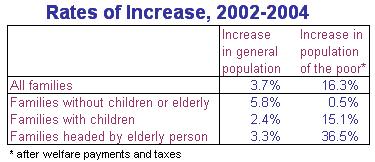Dan Ben-David Tel-Aviv University Welfare payments and taxes were cut during the years 2002-2004. The outcome was reflected in an increase in the share of families living below the poverty line according to their net incomes – from 18.1% in 2002, to 19.3% in 2003, to 20.3% in 2004. The poverty picture among the children is even more problematic. The percentage of children living under the poverty line jumped from 29.6% in 2002 to 33.2% in 2004. Had Israel’s Social Security Institute presented the numbers a bit differently, it would have been possible to look at the poverty picture from a different perspective, one that is no less problematic. The total number of families in Israel grew by 3.7% between 2002 and 2004. During this same period, the number of poor families grew by four times as much (16.3%).  The group of families that increased at the fastest rate was the group without children or headed by an elderly person. While this group grew by 5.8% in the years 2002-2004, the number of its poor families remained nearly unchanged. For the largest group of families, those with children, the past couple of years evolved quite differently. While the total number of families with children grew by 2.4%, there was a 15.1% – that is, a six-fold – increase in the number of poor families with children. When half of all the children in first grade today are in either ultra-orthodox or Arab school systems, and when 80% of ultra-orthodox men and Arab women do not even look for work, then it is understandable how a cut in welfare payments could lead to such a steep rise in the number of poor families with children. What is less understandable is why a government that was so aggressive in reducing welfare was not as equally aggressive in pursuing policies that would have provided the tools and the work-enhancing conditions to those same population groups that would have enabled them to successfully compete in a modern and open economy. No less perplexing is what happened to the elderly. During the years 2002-2004, the total number of families headed by an elderly person rose by 3.3%. During this same period, the number of elderly families living below the poverty line rose by 36.5%. The increase in poverty-stricken elderly families outpaced the natural increase in elderly families by a factor of 11! Something extremely problematical, and very rapid, is occurring here. Although elderly families constituted about a fifth of the families overall and roughly a fifth of the poor families in Israel in 2002, they comprised nearly one-half of all the new families that fell under the poverty line during the past two years. As a result of Benjamin Netanyahu’s economic policies, the elderly – who still constitute one-fifth of Israel’s families – now constitute about one-quarter of the country’s poor families. And all this occurred in the space of just two years. Our just retired finance minister, and future prime ministerial candidate, does not appear to have grasped that modern free markets are not the conceptual equivalents of jungles in which there are no rules and the strong devour the weak without mercy. So that there will not be any misunderstanding: any society wishing to improve its standards of living needs an open and competitive economy. This is a necessary but insufficient condition since an economy cannot take off unless the government understands that market failures exist and need to be dealt with – and recognizes its responsibility in building the human and physical capital infrastructures that will enable all of its people to realize their full potential. When a finance minister incessantly preaches about the need for Israel to remain in Gaza for an indefinite and exorbitantly expensive (in blood and shekels) period – and hopes that his advocation of this policy will help attain the coveted prime minister’s chair – while ceaselessly calling for budget cuts because the country doesn’t have enough money, when government ministers intimate that the people of Israel are lazy in order to justify slashing welfare assistance with the end result of pushing primarily the elderly into poverty, when our elected government forces people to contend with a labor market while lacking the basic skills and conditions to do so, when all this is done with minimal enforcement of labor laws and under an ever-growing shadow of governmental corruption – then what we have developed here is a brutal jungle with minimal resemblance to a true “free market”. There are people who must be held accountable for what has transpired in Israel over the past several years and there is such a thing as judgment day. It is called election day.
|